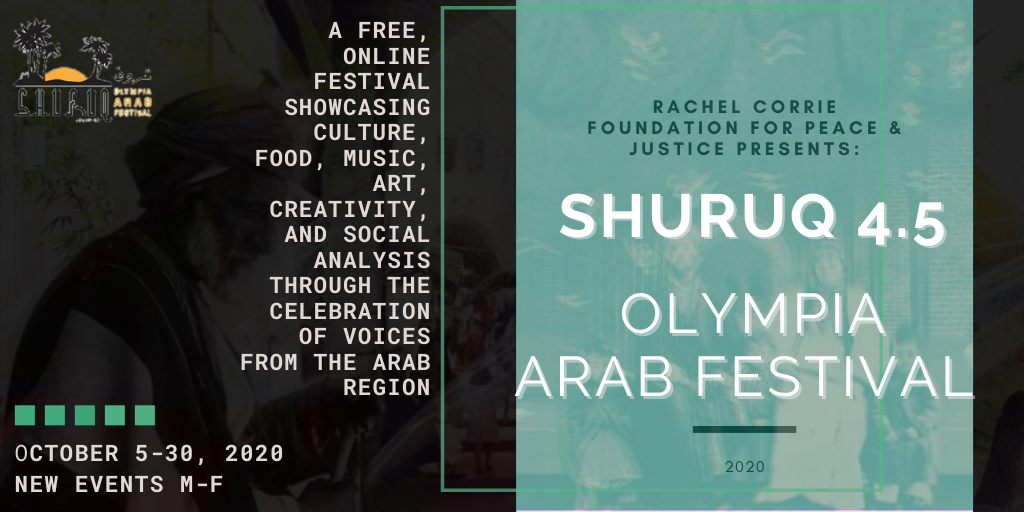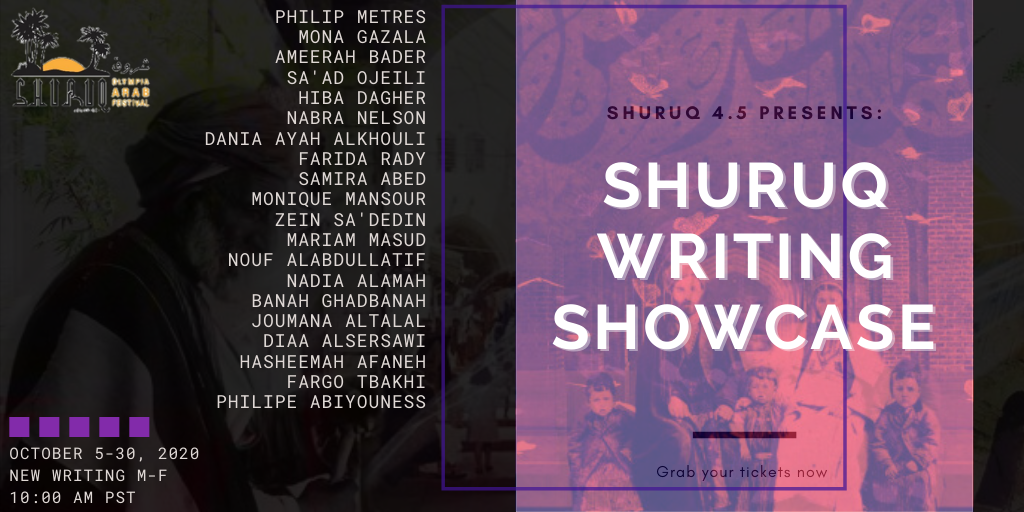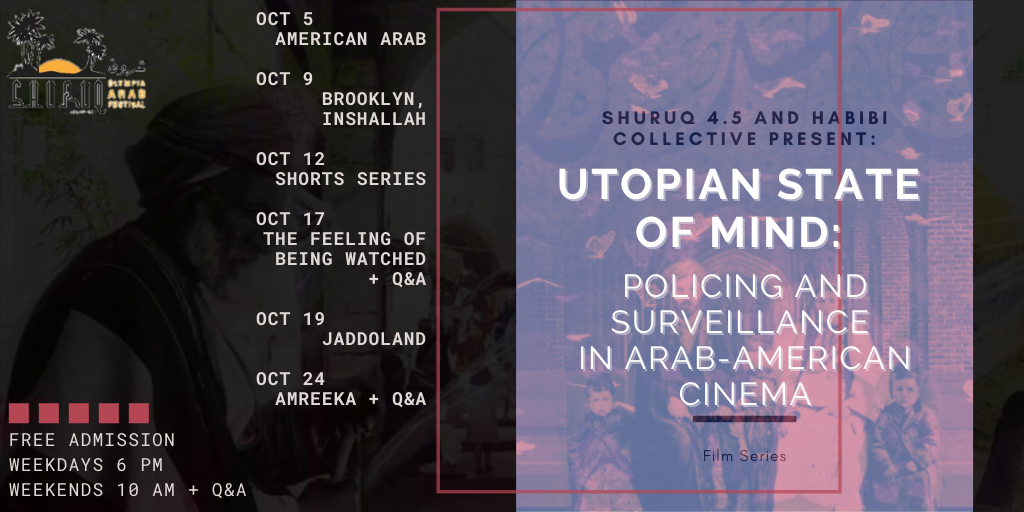


Upcoming Festival Events
WEEK 1:
Monday, Oct 5:
Iraqi-American filmmaker Usama Alshaibi (Nice Bombs) shares his own story of experiencing racism in post-9/11 America. Showcasing the diversity of Arabs living in the United States, American Arab sparks a frank conversation about identity and perception, and argues for giving people “the space to be complicated.”
Tuesday, Oct 6:
Wednesday, Oct 7:
This live reading showcases seven Arab-American authors featured in the Shuruq 4.5 writing series. This is the first of a two-part reading series, and features Banah Ghadbanah, Diaa Alsersawi, Fargo Tbakhi, Hasheemah Afaneh, Farida Rady, Philipe AbiYouness, and Samira Abed.
Thursday, Oct 8:
Moroccan and Puerto Rican food blogger Salima from Salima’s Kitchen is here to share a classic Moroccan Tomato Salad. This dish is traditionally served as a side salad, but also tastes fabulous on top of omelettes, with any kind of meat or on top of a toasted slice of bread.
Friday, Oct 9:
Khader El-Yateem, an Arab American Pastor from Palestine, and Linda Sarsour, organizer of the Women’s March on Washington, come together in the wake of President Trump’s anti-Muslim policies. With Sarsour’s support, El-Yateem runs for New York City council. Will he be the first Arab American to ever win a seat in the race? The documentary follows the drama of his candidacy.
WEEK 2:
Monday, Oct 12:
Like Salt: While boxing and jazz rely on improvisation, they both have a deep sense of resilience. Hala, an Arab American female boxer in New York City, and Kendrick, an African American jazz musician, improvise their way through a passive aggressive America. She’s Miles Davis in boxing gloves and he’s Muhammad Ali refusing to live a lie.
Planet of the Arabs is an experimental short on Hollywood’s negative depiction of Arabs and Muslims through the decades. Inspired by Dr. Jack Shaheen’s book “Reel Bad Arabs”, Planet was an official selection at the 2005 Sundance Film Festival and continues to screen at art exhibits and used in classrooms as an educational tool on stereotypes in the media.
Madina IA: Two Arab immigrant sisters navigate the cold and violent land of a ghost town in the American Midwest. The absurdity of their surroundings mixed with their previous life begins to loom over their relationship, threatening the only comfort they have ; each other.
Tuesday, Oct 13:
Seattle in the 1990s saw a critical shift in Arab feminist organizing work. Founding members of Seattle’s Arab Women’s Solidarity Association (AWSA) include Therese Saliba, professor and dean at the Evergreen State College, Nadine Naber, renowned Arab American scholar/activist; and Lena Khalaf Tuffaha, poet, writer and co-founder of IMEU. Join these panelists in a reflective conversation on the history of AWSA and the future of Arab feminism in the arts, media, and political organizing.
Wednesday, Oct 14:
Thursday, Oct 15:
Join Vancouver, B.C.- based Canadabkeh troupe in this specially- choreographed piece, showcasing the beauty of Levantine folkloric dance! Video is pre-recorded and available for multiple viewing.
Friday, Oct 16:
Saturday, Oct 17:
Assia Bendaoui sets out to investigate long-brewing rumors that her quiet, predominantly Arab-American neighborhood was being monitored by the FBI. When she’s investigating, she exposes a surveillance program on a scale no one could have imagined.
Shuruq 4.5 and Habibi Collective present a live screening of the feature film, The Feeling of Being Watched. Following the screening, join Habibi Collective founder Róisín Tapponi, and director Assia Boundaoui, for a Q&A session on surveillance in Arab American cinema.
WEEK 3:
Monday, Oct 19:
A visit to her mother’s home art studio in Texas prompts the filmmaker to explore the meaning of home and the search for belonging across three generations of her Iraqi family.
Tuesday, Oct 20:
The Gaza Strip has been made into an Israeli combat zone with the decided aim of crushing Palestinian resistance. Israeli weapons, most of which are courtesy of Washington, have for, at least, 14 years turned Gaza into the world’s largest open air prison. But neither prison nor siege have ended the Palestinian struggle for freedom. Palestinians in Gaza, as elsewhere, are determined to claim their rights, no matter how high the price. The discussion will touch on the stories of real Palestinians who have paid a high price for their resistance, in all of its forms.
Wednesday, Oct 21:
This live reading showcases seven of the selected Arab-American authors featured in the Shuruq 4.5 writing series. This is the second of a two-part reading series, featuring Dania Ayah Alkhouli, Joumana Altallal, Nabra Nelson, Hiba Dagher, Philip Metres, & Nadia Alamah.
Thursday, Oct 22:
A solo performance in poetry by Fargo Tbakhi, My Father, My Martyr, and Me asks audiences to engage in the project of unlearning the criminality always already layered onto the Palestinian body. Using an invented method called “unarcheology” to examine Fargo’s life, his father’s life, and the life of Sirhan Sirhan, the performance seeks to decolonize possibilities for solidarity, support, and love towards the survival of the Palestinian people. Staged on and around a large pile of dirt, the performance uses a nonlinear, queer, decolonial approach to text and to aesthetics to ultimately ask: in the face of decades of colonization, erasure, and colonization, how can we love each other better?
Friday, Oct 23:
This multimedia presentation highlights the indigenous solidarities inherent in decolonial relationships to land. Following the destruction of the Olympia-Rafah Solidarity Mural in the summer of 2020, this project pays homage to the community-led reconstruction efforts, while highlighting the voices of indigenous and Palestinian authors Gail Tremblay, Mona Gazala, and Ameerah Bader.
Saturday, Oct 24:
Amreeka chronicles the adventures of Muna, a single mother who leaves the West Bank with Fadi, her teenage son, with dreams of an exciting future in the promised land of small town Illinois. In America, as her son navigates high school hallways the way he used to move through military checkpoints, the indomitable Muna scrambles together a new life cooking up falafel burgers as well as hamburgers at the local White Castle.
Told with heartfelt humor by writer-director Cherien Dabis in her feature film debut, Amreeka is a universal journey into the lives of a family of immigrants and first-generation teenagers caught between their heritage and the new world in which they now live and the bittersweet search for a place to call home.
WEEK 4:
Monday, Oct 26:
Faisal Saleh of Palestine Museum US will provide an introduction to the Museum and interview Laura about her recent work and new book.
Tuesday, Oct 27:
Wednesday, Oct 28:
Thursday, Oct 29:
Shuruq 4.5 presents a live, shared oud & rap set by talented Yemeni artists Layle Omeran and Amaani Yahya.
Layle is an interdisciplinary migrant Yemeni artist and community interpreter. Layle works primarily with language, sound and critical spiritual inquiry to explore meanings of home, belonging, memory, and a migrant queer body theology. Layle’s work manifests in the form of music making, poetry, 2D visual art, and space curation. Layle has performances in YallaPunk, Boston Center for the Arts, the CreateWell Fund, the International Rescue Committee and more. You can find out more about Layle’s work at www.layleomeran.com
Amaani Yahya is a Yemeni rapper and a women’s rights activist who uses rap as a medium to communicate with younger generations and draw greater attention to important causes in Yemen such as child marriage.
Friday, Oct 30:
6 pm: Closing Event – TBA





